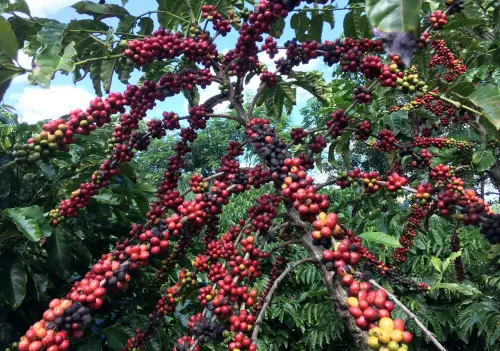In a bustling Brazilian coffee warehouse that typically houses a quarter of a million bags of aromatic beans, voices now reverberate through the largely vacant space of a major producers' cooperative in Guaxupe. Brazil's coffee farmers, grappling with one of the most severe droughts on record, have already sold most of their beans well ahead of the new harvest, with prices nearly doubling to unprecedented levels over the past 14 months.
Last year, consumers were surprised by a 16% increase in the price of a large cup of Starbucks coffee, now reaching up to $3.85, while Nespresso subscribers are anticipated to see a rise from $1.30 to $1.45 per basic coffee pod.
The cost of arabica beans, widely used in ground roasted coffee, surged by 70% in 2024 and nearly 20% this year, surpassing $4.30 per pound by February 11. Robusta beans, the second most popular type commonly found in instant coffee, saw a 72% increase in 2024, peaking at $5,847 per metric ton on February 12.
Despite the escalating prices, coffee enthusiasts are not giving up their favorite beverage. It is projected that global coffee consumption may surpass production in 2025 for the fourth time in six years.
In Brazil, the largest coffee producer globally, farmers capitalized on record exports in 2024 by depleting their stockpiles. In contrast, exports from Vietnam, the leading robusta supplier, dropped by 17.2% as adverse weather conditions impacted production last year.
"We have never experienced such low inventory levels in February, still far from the new harvest," noted Willian Cesar Freiria, sales manager at Cocapec, Brazil's third largest coffee cooperative in the town of Franca, Sao Paulo state. The cooperative received 1.1 million bags from affiliated farmers in 2024, a decrease from 1.5 million bags in 2023 due to diminished regional production caused by another year of inadequate rainfall.
Freiria highlighted, "We won't have a substantial amount of coffee for sale until the new harvest begins, and this shortage is widespread."
Although appearing abundant, stocks at Cooxupe, the world's largest coffee cooperative in Minas Gerais, Brazil's primary coffee-producing state, are mostly already sold to final buyers awaiting shipment, clarified Andre Silva Pinto, Cooxupe's storage coordinator.
Luiz Fernando dos Reis, sales superintendent for Cooxupe, disclosed that farmers have already sold 90% of the 2024 crop, leaving a historically low remainder.
Smaller farmers like Osmar Junior from southern Minas Gerais and Paulo Armelin from Cerrado Mineiro region are feeling the effects, with Junior reporting no surplus coffee to sell and Armelin opting to retain 40% of his 2024 crop. Despite the price surge, Armelin hopes his high-quality beans will fetch $4.50 per pound from a prospective buyer in San Francisco.
Daterra Coffees owner Luis Norberto Pascoal, a significant arabica grower, acknowledges the benefits smaller farmers are reaping but expresses skepticism about the sustainability of current high prices. Pascoal anticipates that many roasters will struggle to afford beans, potentially compromising the quality of coffee in the market.
